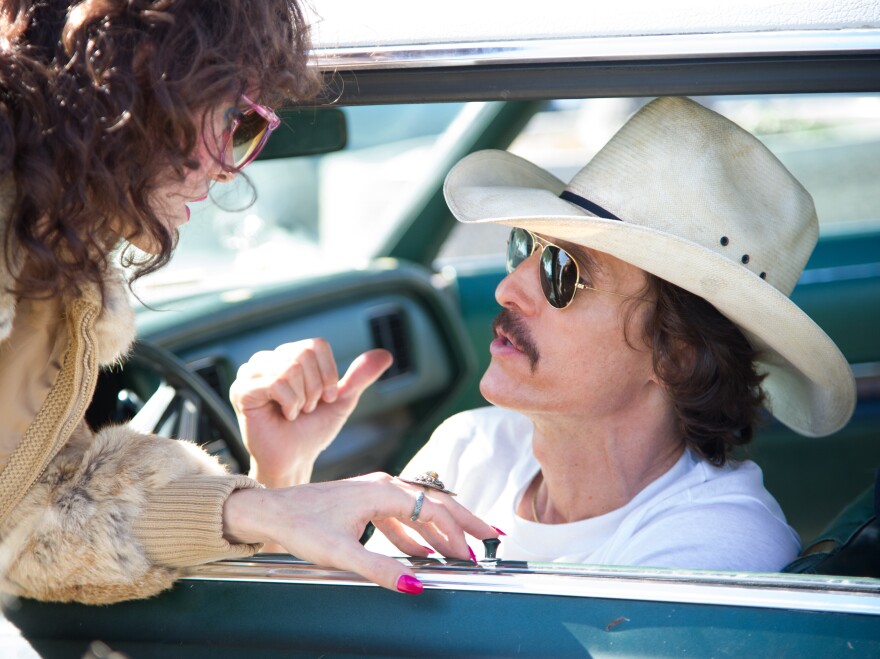Feisty. Stubborn. A real cowboy. According to people who knew him, the real Ron Woodroof was very much like the character played by Matthew McConaughey in the new movie Dallas Buyers Club.
Bill Minutaglio — who wrote about Woodroof for The Dallas Morning News — describes him as "salty."
"I kinda liked him. He cursed like four sailors," says Minutaglio.
Chicago attorney Michael Cascino represented Woodroof in a case against the Food and Drug Administration.
"Ron was full of life. ... He'd greet you with a white shirt and a red tie and stories to tell," says Cascino.
Stephen Nightingale, who was the medical director of the AIDS clinic at Parkland Memorial Hospital in Dallas, says Woodroof was all Texas — complete "with a pickup truck and a shotgun."
He also had, says Nightingale, "a very, very bad disease."
Woodroof's Dallas Buyers Club was in full swing by the time Nightingale met him in 1988. Nightingale says he didn't approve of people who were untrained treating the very sick with unapproved drugs. But he does remember that Woodroof was trying to be part of the solution.
"We would talk every two or three months," he says. "I'd reach out to him. He'd call me up, see what I thought of something. And I usually wasn't too enthusiastic about it."
Nightingale likens the early days of the AIDS epidemic to the movie No Country for Old Men, in which a murderous psychopath terrorizes a town and completely eludes its sheriff, Tom Bell.

"There was this amorphous evil that went around just killing people randomly, and nobody seemed to understand it," Nightingale says. "And I think many of us who were treating — or otherwise involved with — people with AIDS at that time would've felt very much like Sheriff Bell."
In the 1992 documentary The AIDS Underground, Woodroof drives across the border to a pharmacy in Mexico. You can see just what a hustler he is when he talks about how he'll bluff his way through customs if they find his large stash of drugs in the trunk.
"You just have to be sure that you've got soles on the bottom of your shoes," Woodroof says. "Because when I say 'song and dance,' I'm not joking. You better. I will have an answer, because if I ever stutter they'll tear me apart," he says.
Woodroof constantly kept tabs on what new treatments were in the pipeline. He traveled overseas to find them, then tried them out on himself. In the documentary, he boasts that when he started injecting himself with the drug peptide T, "it had never been injected" before.
Among other buyers clubs in the U.S, the one in Dallas had a reputation as a kind of Wild West affair, says Minutaglio.
"People kept saying, 'Well, the Dallas Buyers Club, they're the pirates. They're the ones really out on the edge pushing the envelope, doing more crazy and intense work than anybody else,' " he says. " 'They take more risks.' "
It was scary work. Mary Franklin was a receptionist at the Dallas Buyers Club — the "front person," as she puts it.
"I was getting nervous about being busted," she says, "because I knew what we were doing was illegal — or just barely legal."
But Franklin, who's spent 20 years working for AIDS-related causes, says it was worth it. Her close friends were dying, and the Dallas Buyers Club gave them a little hope.
"I know it made them feel more powerful about their disease," Franklin says. "That they had a fighting chance, which is something the government was not offering."
Woodroof fought the government, too. He sued the FDA over a ban on a drug he was using. He was a plaintiff in the Dallas Gay Alliance's discrimination lawsuit against the Dallas County Hospital District, though he wasn't gay himself.
In that 1992 documentary, Woodroof says he just refused to listen to people who told him he was going to die.
"Just logically, I'm going, 'Well, instead of letting these guys kill me, let me try anything I can get my hands on.' Because if it kills me, at least I died trying."
Woodroof died on Sept. 12, 1992. His lawyer, Michael Cascino, said Woodroof always wanted to have a movie made of his life — and he would've gotten a kick out of being played by a big Hollywood star.
Copyright 2021 NPR. To see more, visit https://www.npr.org.



